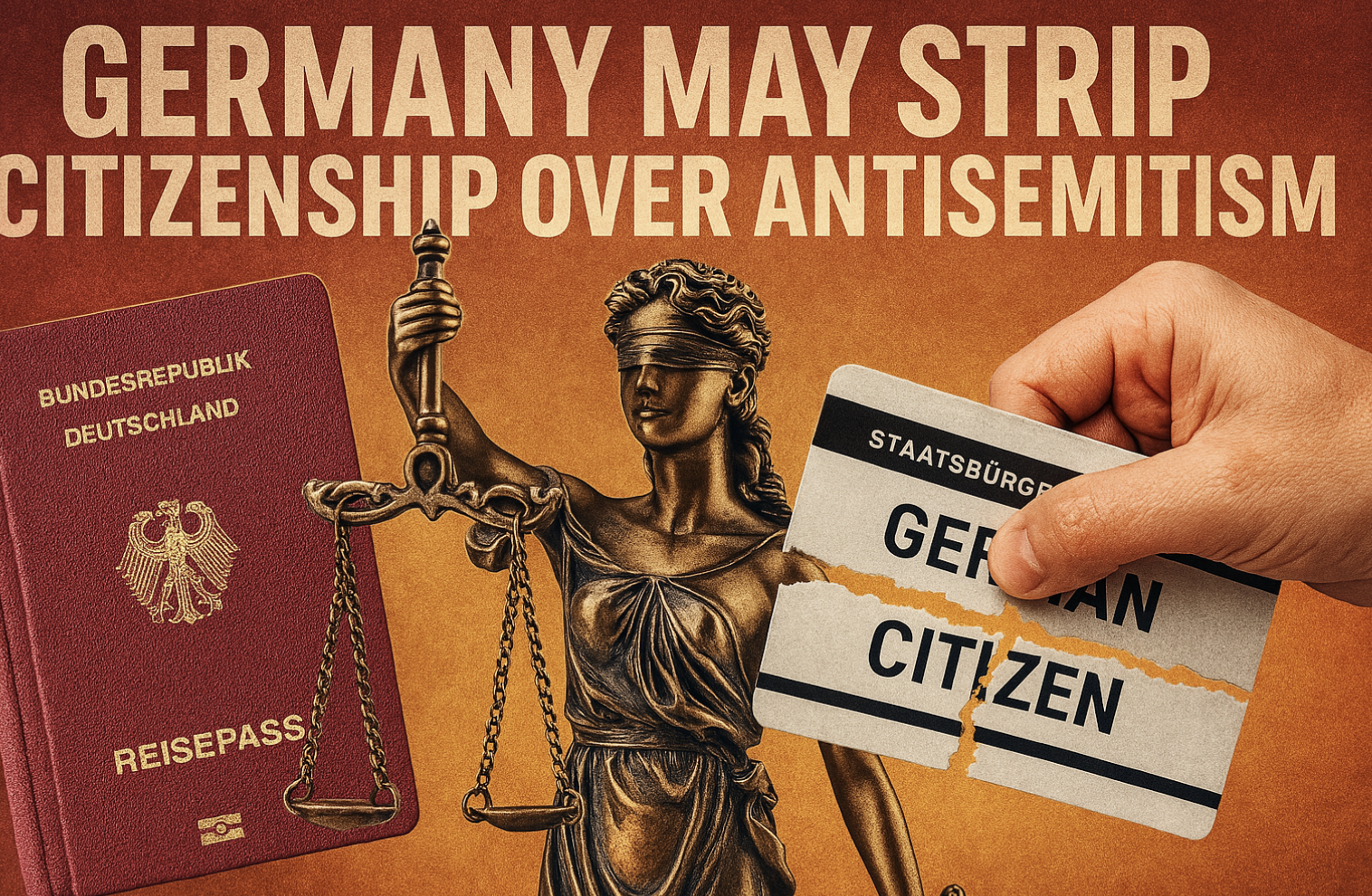Amid Widespread Criticism: How Vague Accusations Threaten Dual Nationals in Germany

“NGOs have warned that the new German proposal exploits citizenship to pursue political agendas.”
German passports could be revoked from ‘supporters of terrorism, anti-Semites, and extremists’ if they hold a second citizenship, according to the parties negotiating to form the government coalition.
While German parties view the law as aimed at preventing extremism and promoting integration, its critics assert that it constitutes a serious violation of human rights and freedom of expression, and discriminates between citizens based on their political positions.
Between defending national sovereignty and protecting democratic rights, this law appears set to remain the subject of a long political and legal struggle both inside and outside Germany.
An October 2024 survey showed that the states of Bavaria, Saxony, North Rhine-Westphalia, Schleswig-Holstein, Hesse, and Rhineland-Palatinate were open to changing the law to revoke the citizenship of dual-nationals who committed antisemitic crimes.
Amid this controversy, the most important question remains: Is the German government seeking to protect its national security, or is it using citizenship laws as a political tool to suppress dissenting voices?
Citizenship laws
A leaked paper reveals that Germany's conservative political parties want to add a clause to Germany's Nationality Law to allow the country to revoke German nationality from dual nationals if they are deemed supporters of terrorism, antisemites, and extremists.
With the headline ‘Citizenship law’, the paper said that the authorities are committed to reforming the current citizenship law.
Antisemitism is not a criminal offense in Germany – it must fulfill the criminal offense of incitement to hatred, which does apply to many antisemitic statements, including Holocaust denial.
Therefore, it is still not clear how it will be decided that someone is an antisemite or extremist.
The leaked paper came during negotiations to form the next coalition government in Germany between the Conservative bloc - the Christian Democratic Union (CDU) and Christian Social Union (CSU) - and the center-left Social Democratic Party (SPD).
Dirk Wiese, an SPD politician, who was involved in the working group focused on Domestic Affairs, Law, Migration, and Integration promoted dual citizenship as a success for his party.
He said for DW that his party had ensured that the dual citizenship possibility remained in place. On the other hand, as Wiese explained, the CDU/CSU had wanted to roll this possibility back.
So far, the SPD has rejected the proposal for the clause.
For years, the SPD has opposed such nationality revocation schemes in political debates.
Legal experts say that the idea may not pass through constitutional review, but the confusion remains disturbing for many dual nationals.

A Political Tool
The new proposal has faced widespread criticism, particularly from NGOs, for exploiting German citizenship to advance a political agenda based on subjective assessments of wrongdoing.
While international law treats citizenship as a state’s prerogative, except where it leads to statelessness, withdrawal should not be arbitrary and only occur in exceptional and narrowly defined cases.
Article 16 of Germany's Constitution, the Basic Law, stipulates that no German may be deprived of his citizenship unless in extreme circumstances, such as joining a terrorist organization, and only if the individual possesses another nationality.
During the recent federal election campaign, the CDU/CSU repeatedly called for a tightening of the regulation.
In early January, the conservative union's chancellor candidate Friedrich Merz announced that people who commit crimes and have dual citizenship would be deported.
Shortly afterward, the head of the CSU, Markus Soder, wrote on X: “Anyone calling for a caliphate must be stripped of dual citizenship.”
According to some Social Democrats, the proposal to revoke German citizenship due to antisemitism and extremism will lead to unequal treatment of those calling Germany their home.
A number of SPD politicians, including the mayor of Bremen Andreas Bovenschulte, raised concerns about the consideration of revoking citizenship for this group of dual nationals.
Speaking for German local media, he said that the message given to around five million people with dual citizenship living in Germany was a big problem.
He emphasised that dual nationals would get the impression that their citizenship is less important and that they do not really belong in Germany.
In this regard, Clara Bunger, a member of the Bundestag for the Left Party, called the proposal a two-class citizenship law.
“We don't need a migration society. We need very clear rules and legal certainty for everyone –– as well as equal rights for all people in Germany,” she said.

The new proposal comes in the context of rising concern over freedom of speech in Germany, especially related to the so-called Palestinian-Israeli conflict.
Over the past few months, pro-Palestinian activists, organizations, and even academics have increasingly faced limits on their ability to protest, speak publicly or organize.
In many cases under the guise of curbing antisemitism, public demonstrations or gatherings in support of Palestinian rights have been canceled or banned — even if they have been peaceful.
Adding to the challenge is a recent resolution from Parliament on antisemitism that has drawn criticism from multiple human rights organizations for conflating legitimate political discussion with hate speech.
Critics say these measures chill free expression and stifle needed debate on truly international human rights issues.
The CDU/CSU proposal might serve to stifle critical voices even more, especially those from migrant communities or human rights advocates for Palestine.

Illegal Action
In a related context, The Intercept reported that Germany is adopting American methods in targeting pro-Palestinian activists.
“Berlin intends, without legal justification, to expel four young men from the country on the grounds of anti-Semitism and disturbing the peace,” it said.
It noted that the illegal action of the Berlin Interior Ministry in expelling two Irishmen, a Pole, and an American after they had lived in the country for a long time is a failure of the rule of law.
It noted that the deportation of the four young men, scheduled for the 21st of this month, has no legal basis, but rather comes on the basis of orders from the Berlin Interior Ministry due to their participation in pro-Palestinian demonstrations and protests.
It criticized the German political executive's reliance on what it calls ‘Germany's national commitment to defend Israel’ to expel those in solidarity with Palestine.
It noted that this is not a legal concept and is criticized by many for adopting an inaccurate and politically motivated definition of anti-Semitism.
It described Berlin's policies as a clear indication of the continuation of a long process of elimination, repression, and marginalization of people whom German authorities and politicians consider anti-Semitic.

Human rights organizations, such as Amnesty International, view such measures as an attack on freedom of assembly and liken the repression of protesters to that experienced in authoritarian regimes.
Amnesty International already noted in 2024 that two opposition groups, particularly in Germany, face the threat of state repression—climate activists and pro-Palestine groups.
Germany is not alone in this, as politicians in the Netherlands and Denmark have also called for stricter laws to combat antisemitic hate crimes, sometimes suggesting visa bans or deportations.









